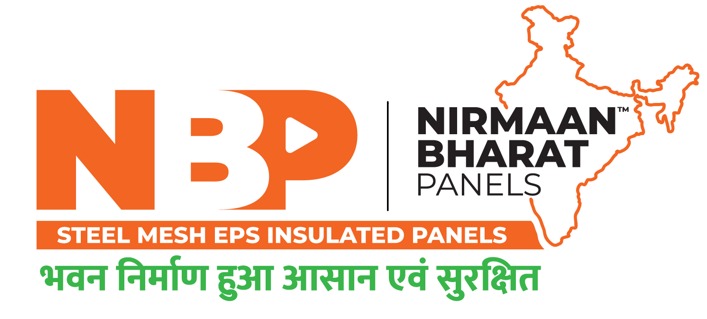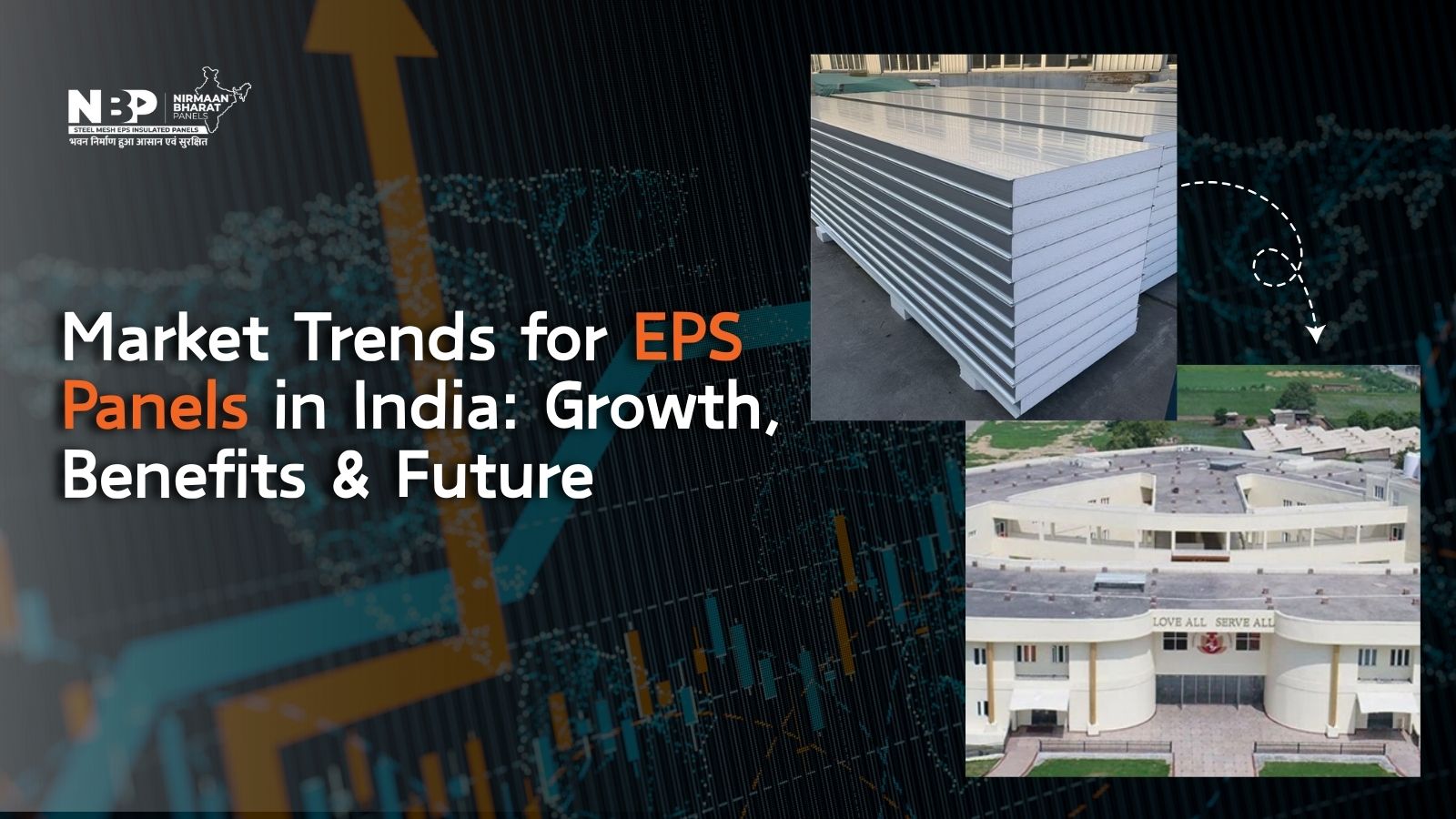In recent years, India’s construction sector has increasingly focused on sustainable, efficient, and affordable solutions to meet the growing demand for housing, commercial, and industrial buildings. Expanded Polystyrene (EPS) panels have emerged as a game-changer in this context, offering benefits like energy efficiency, thermal insulation, and cost-effectiveness. Nirmaan Bharat Panels, a leader in manufacturing EPS panels, is at the forefront of this trend, driving the adoption of these versatile panels across the country. In this blog, we explore the market trends for EPS panels in India, the benefits they offer, and the future outlook for this innovative construction material.
Table of Contents
ToggleWhat Are EPS Panels?
EPS panels, or Expanded Polystyrene panels, are lightweight, strong, and energy-efficient building materials composed of EPS foam sandwiched between two outer layers of galvanized steel or cement board. These panels are known for their superior insulation properties, soundproofing capabilities, and eco-friendly attributes. The EPS core acts as an insulator, reducing heat transfer and helping maintain comfortable temperatures indoors, making EPS panels an ideal solution for diverse applications in residential, commercial, and industrial buildings.
Growth of EPS Panels in India’s Construction Market
India’s construction industry has been evolving rapidly, driven by factors such as urbanization, population growth, and government initiatives like the “Housing for All” and “Smart Cities” missions. These initiatives are creating a huge demand for affordable and sustainable construction materials, with EPS panels fitting perfectly into this vision.
a) Increasing Demand for Green Building Materials
As awareness of sustainable construction practices grows, green building materials like EPS panels are gaining traction. EPS panels are recyclable, energy-efficient, and reduce the environmental footprint of buildings, aligning with the goals of green building certification programs like LEED and GRIHA in India.
b) Rising Popularity in Residential, Commercial, and Industrial Sectors
EPS panels are being adopted in various sectors due to their adaptability and cost benefits. In residential projects, they are used for partition walls, roofing, and cladding. In commercial and industrial construction, EPS panels are valued for their ability to enhance energy efficiency, thereby reducing long-term operational costs. Moreover, the lightweight nature of EPS panels allows for faster and more cost-effective construction.
c) Government Initiatives Fueling Demand
The Indian government’s push for affordable housing and infrastructure development has provided a significant boost to the EPS panel market. Policies promoting energy-efficient materials and the implementation of the National Building Code (NBC) 2016, which encourages the use of environmentally friendly materials, have accelerated the acceptance of EPS panels across public and private construction projects.
Benefits of EPS Panels: Efficiency and Cost-Effectiveness
EPS panels offer several benefits that make them a preferred choice among builders, architects, and property developers.
a) Thermal Insulation
One of the primary advantages of EPS panels is their excellent thermal insulation properties, which help in reducing heating and cooling costs. The insulation capacity of EPS foam minimizes heat transfer, maintaining a comfortable indoor environment and lowering energy consumption for air conditioning.
b) Soundproofing Qualities
EPS panels also provide soundproofing, making them ideal for urban buildings where noise pollution is a concern. Their ability to absorb sound and reduce noise transmission between rooms makes them suitable for homes, offices, and public spaces.
c) Cost Savings
Using EPS panels can reduce construction costs due to their lightweight nature, which minimizes the need for heavy structural support. The reduced weight also lowers transportation costs, making them an economically viable solution for large-scale projects.
d) Durability and Low Maintenance
EPS panels are resistant to moisture, insects, and weather, ensuring long-lasting performance with minimal maintenance. This durability makes them an attractive choice for building facades and other exposed surfaces.
Key Market Trends Influencing EPS Panel Adoption
a) Increasing Preference for Prefabrication
Prefabrication is rapidly gaining popularity in the construction industry as a means to reduce project timelines and costs. EPS panels are an ideal material for prefabricated structures because they are lightweight, easy to handle, and compatible with various architectural designs. Prefabricated buildings using EPS panels are becoming increasingly popular for schools, hospitals, and housing projects, where time and cost efficiency are critical.
b) Rising Demand in Cold Storage and Industrial Applications
EPS panels are widely used in cold storage facilities and warehouses due to their superior thermal insulation capabilities. These panels help maintain consistent temperatures, essential for preserving perishable goods and are cost-effective compared to traditional insulation methods. The demand for EPS panels in the cold storage and logistics sectors is anticipated to grow, particularly as India continues to develop its logistics and warehousing infrastructure.
c) Use of EPS Panels in Disaster-Resilient Construction
EPS panels are gaining attention for their role in disaster-resilient construction. Their lightweight yet strong structure makes them suitable for building earthquake-resistant structures. EPS panels have also shown resilience against floods and high winds, which is crucial for regions in India prone to natural disasters. As climate change drives the need for resilient infrastructure, EPS panels are becoming a preferred choice for constructing safe, durable buildings.
d) Technological Advancements and Product Innovation
The EPS panel market is witnessing continuous innovation, with manufacturers developing new formulations and designs to enhance performance. Innovations such as fire-resistant EPS panels and panels with enhanced thermal insulation properties are creating additional opportunities for the material’s application in high-rise buildings and critical infrastructure.
Challenges and Future Outlook
a) Addressing Fire Safety Concerns
One challenge that EPS panels face is fire safety, as traditional EPS foam is combustible. However, advanced EPS panels with fire-resistant additives have been developed to address these concerns. With increased awareness and technological advancements, the fire safety profile of EPS panels is improving, helping to expand their applications.
b) Lack of Awareness and Skilled Workforce
Despite their benefits, EPS panels are still relatively new in India’s construction industry, and awareness about their potential is limited. Additionally, there is a shortage of skilled workers trained in EPS panel installation, which could hinder growth. Addressing these gaps through education and training initiatives will be crucial for the future of the EPS panel market.
c) Positive Market Growth and Expansion
The EPS panel market in India is expected to experience significant growth in the coming years due to the country’s rapid urbanization, infrastructure development, and shift towards sustainable construction practices. With increasing investments in technology, awareness, and skilled labor development, the EPS panel industry is poised for expansion.
Future Prospects for EPS Panels in India
The future of EPS panels in India looks promising, with growing demand for sustainable construction materials and the need for rapid, cost-effective building solutions. Several factors are expected to drive this growth:
- Increased Adoption in Smart City Projects: The Indian government’s Smart Cities Mission will increase the demand for sustainable materials like EPS panels to ensure energy efficiency in urban infrastructure.
- Technological Advancements: Innovations such as fire-retardant and water-resistant EPS panels will enhance their appeal and applications across a wider range of projects.
- Expansion into New Sectors: As awareness of EPS panels’ benefits grows, they are likely to be adopted in new sectors, including healthcare, education, and public infrastructure.
EPS panels represent a transformative shift in the construction industry towards greener, more efficient building materials. For Nirmaan Bharat Panels, staying at the forefront of this trend and continually innovating to meet the evolving needs of the market will be key to capitalizing on these promising market trends.
Conclusion
As the construction industry in India continues to evolve, market trends for EPS panels highlight their role as a sustainable, versatile, and cost-effective solution that meets the demands of modern infrastructure development. By embracing these trends, Nirmaan Bharat Panels can drive the growth of green building practices and deliver efficient, high-quality building solutions across the country.
FAQs
Q1. What are the advantages of using EPS panels in construction?
Ans: EPS panels offer numerous advantages, including excellent thermal insulation, soundproofing, durability, cost savings, and fast installation. Their lightweight structure reduces construction time and minimizes structural load, making them ideal for various building applications in residential, commercial, and industrial projects.
Q2. Are EPS panels safe for use in residential buildings?
Ans: Yes, EPS panels are safe for residential use. Manufacturers are developing advanced EPS panels with fire-resistant properties to address fire safety concerns. Additionally, EPS panels are resistant to moisture, insects, and weather conditions, ensuring long-lasting performance.
Q3.What are the current market trends for EPS panels in India, and how are they influencing the construction industry?
Ans: The market trends for EPS panels in India are showing a strong shift toward sustainable and energy-efficient construction materials. EPS panels are increasingly used across residential, commercial, and industrial sectors due to their lightweight structure, excellent insulation, and cost-effectiveness. As demand grows for rapid, eco-friendly construction, EPS panels are becoming popular in prefabricated buildings, cold storage facilities, and disaster-resilient structures. This trend is also fueled by government initiatives promoting affordable and sustainable housing, transforming EPS panels into a vital component of India’s modern construction industry.


